Our latest Building Better Business guest is a publishing pioneer and an expert on digital strategy.
Katie Vanneck-Smith co-founded "slower, wiser news" publisher Tortoise with James Harding and Matthew Barzun in 2018. Before that Katie worked at Dow Jones, Telegraph Media Group and The Times, where she was instrumental in digital transformation and the launch of membership business models. In 2022 Katie was announced as Chief Executive Officer of Hearst UK, with International President Jonathan Wright predicting she would "bring her inimitable brand of leadership and joy to the business".
Katie, can you tell us all about Tortoise, please?
"When I told the team that I was leaving after five years of helping set up Tortoise, I said, I've been part of the prologue. Tortoise was really James’ idea. In 2016 he was at the BBC, he’d been editor of the Times before that. As a journalist of old, he was feeling a bit disillusioned as a journalist, with things like the outcome of Brexit and Trump – on both sides of the Atlantic, the mainstream media missed both those big stories. And I think the Trump outcome was quite a moment for journalists to reflect - how did we miss those stories?
James’ reflections came as he was busy producing four seconds of news for every one second of the day. He was asking - were we so busy chasing the news that we weren't taking the time to reflect on the forces driving that news, and what was happening in our societies?
So he started from that premise. When James first spoke to me about Tortoise in 2017 or 2018 he'd come up with the idea of doing slow news and slow journalism. My reaction was “God, this is amazing”. With my hat on as a marketeer, you could already sense that consumers were turning off. Remember everyone started talking about digital detoxes and the endless scroll.
It felt like there wasn’t just a journalistic problem to solve, but also a consumer problem to solve. For both journalists and consumers, news had become noise.
It felt like there was a place and space to build a slightly different type of news.
So that’s why Tortoise was born. It was there to fix those problems as we saw them and to really try and find a place and space for a slower but also more open newsroom, built with our members.
We felt that thoughtful news could help solve some of the problems with that endlessly scrolling 'hamster wheel' of breaking news."
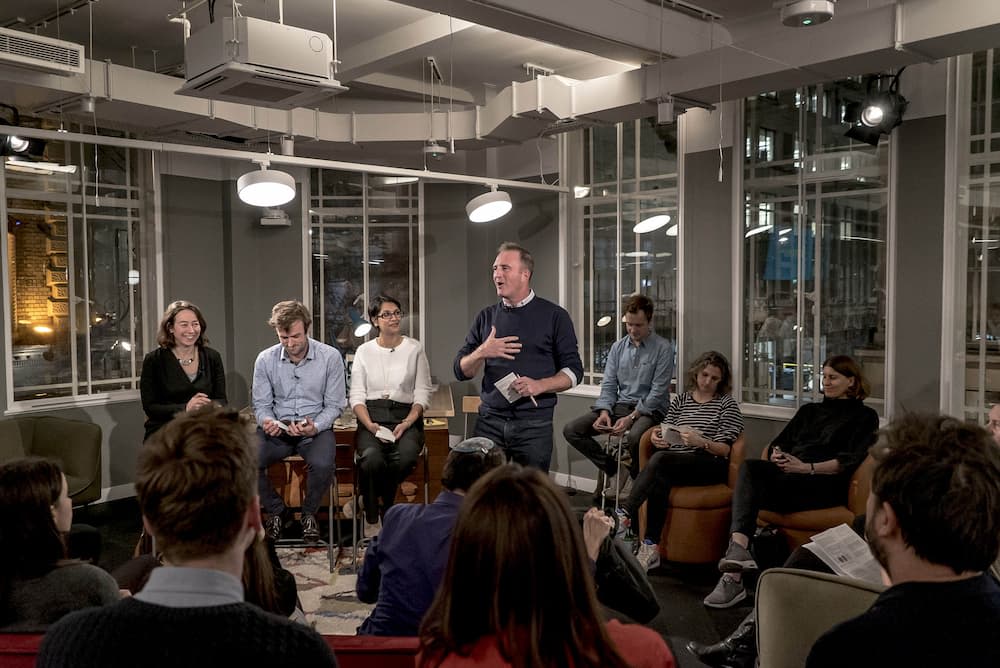
Tortoise was a pioneer of 'slow journalism', coinciding with movements like 'slow food', 'slow fashion' and 'slow travel'. Do you all feel that society and business could be better if we embraced slow and thoughtful?
"Well, we didn’t coin slow journalism – although we did trademark slow thinking. The UK magazine, Delayed Gratification, used the term slow journalism in 2011 or so, and there were European startups like Zetland in this space of constructive journalism and slow journalism.
It's definitely not just about the output, it's about the process and the outcomes, and I think that really matters.
In classic Tortoise style, we were slightly late to the starting line in 2018 but when you're trying to change something that's become a norm, it often takes about 10 years for that change to really resonate and cut through.
It’s fair to say we were part of a bigger movement for slow journalism rather than its designer.
I probably do have a bias towards slow and constructive models - I'm older and I remember a time pre-internet, pre-social media. A slightly simpler world in many ways. There's something very romantic for someone of my age to think about slowing down. It appeals on so many levels - a simpler, more reflective time.
You might think as a result of that, our members and consumers of Tortoise were similar in age - late forties, early fifties but it turns out it's the youngest newsroom in the UK.
Tortoise members skew younger, too - their average age is late thirties. I think that connects with your point about this slow movement in general. I'm lucky enough to remember the joy of having space, and time - and being bored.
I do think that in today’s society there is a very special place for slowing down.
We see it in the digital world – Calm, Headspace, meditation, mindfulness. When Facebook says “we want to have a meaningful feed” you feel like saying “well, get rid of it – let people think instead”.
There’s a correlation between the rise of these products to help people, overload and the dramatic rise of poor mental health.
I think there is an instinctive desire to gravitate towards some of these slower products. We embrace them because we understand them instinctively. But I think younger demographics – the digital natives and now the social natives – are crying out for that balance in their life too.
But it’s not just about slow journalism - I believe in the power of “and” - it's not “either / or”. It’s not only about slow journalism with no breaking news - it's finding that balance which is so important.
We thought digital natives had it hard but look at the social natives – right now the news is about Molly Russell, and what happened to a young 13-year-old girl.
You realise that if we don't get that balance right, we as humanity actually suffer."
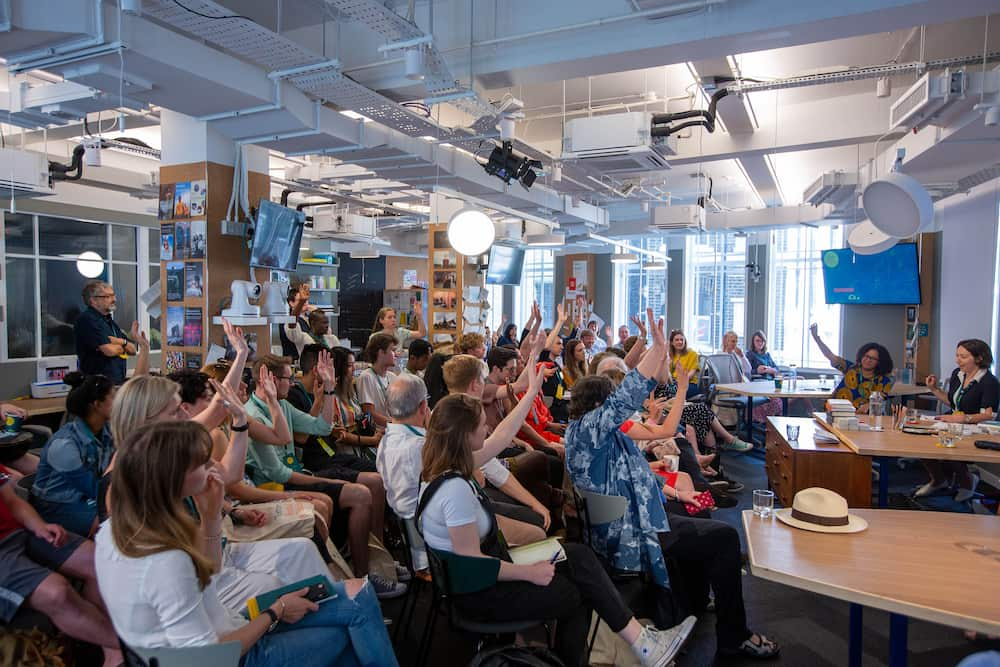
Coming back to business philosophies but staying with the “slow” concept. As a community platform, here at Guild, we help build intentional communities with our clients. Do you think that communities can play a positive role in recalibrating the pace of social media?
"I'm not actually sure whether community is fast or slow, but I think it's critical.
I would say as humans we want to belong, and there's joy in belonging to things.
Whether that’s a place or a space where you can belong, it really matters. I think community, in its broadest construct, is a place where you can belong.
The difference between a community versus a network or other constructs that support business leaders and people in their working life, is that communities are a place where you can both contribute and give back. They have that mutuality.
If you look at Tortoise and its slow journalism, we talk about creating an “organised system of listening”.
I think at the heart of a community is the ability to listen first. If you are there to listen, you are also going to learn.
But it still has that tension – you only get out of a community as much as you contribute, and as you give back, you are more of an active listener.
The reason we think of Tortoise as membership not subscription, is because community matters. Giving people a seat at the table, giving our members a voice in the journalistic process really matters, because we're not trying to educate and inform; we're trying to get to a better understanding.
I don't think you can understand anything unless you have that give and take of community. Basically, it’s all built on listening.
Communities provide that organised system of listening. And when you’re looking at things like systems change, be it in society or business or in life, if you start with listening, you're starting from a good place.
You’ve also got get outside of your echo chambers and social media algorithms. Brexit was missed by the media, not just because they weren’t listening enough, but because weren't listening in the right rooms.
As journalism businesses, we were very quick to blame the echo chambers of Facebook, Twitter, and other social media platforms. But we have our own echo chambers. Look around the newsrooms; they're in major metropolitan areas, historically they've been quite male, definitely very stale and definitely very white.
So you’ve got to build these communities, but I think communities can sometimes become self-serving. You can build a community for support and bring together very specific groups from society, and there is a place and space for those.
But when you’re thinking about building communities to think things through that are different - or hard - you have to design that community in a way that's very different."
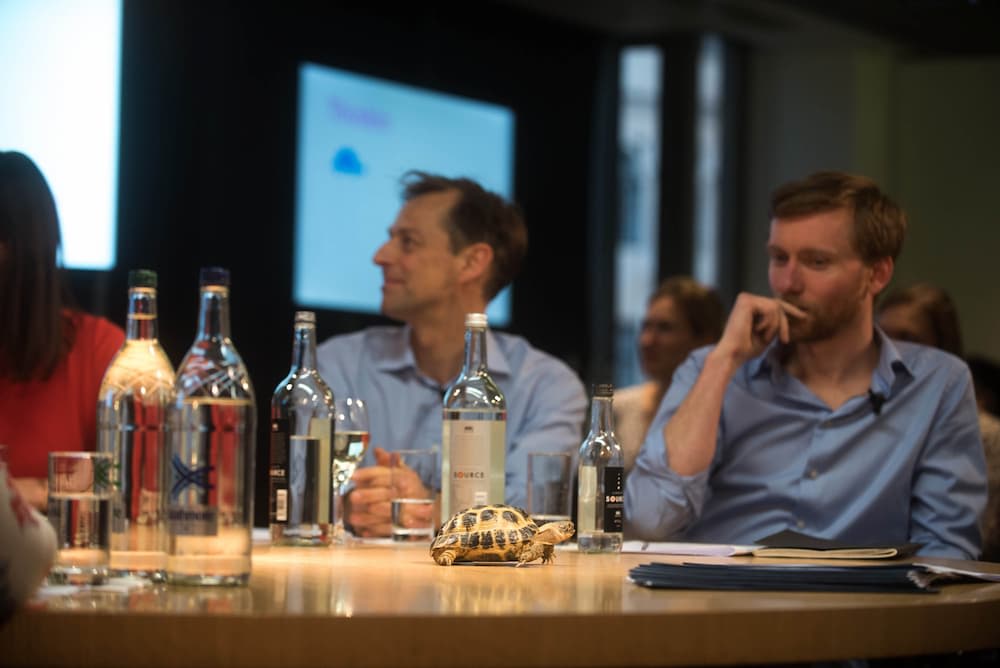
Do you think it's possible to build a business in 2022 without thinking about how community will fit in?
"You can definitely build a business without community being at the heart of it, but it doesn't necessarily make it a good business.
Unfortunately, the world is motivated by money so it’s perfectly possible to build a business without a community. I just don't think I'd want to be part of it, would enjoy working there or would want to buy from them.
But I think there's something interesting, something that's happening in a broader construct. The American political scientist, Robert Putnam, did a ThinkIn at Tortoise and I love some of his early work where he talks about social capital.
I'm from a working-class background and I feel that being an outsider has actually been one of my superpowers.
I've had to learn how to walk into any room and find a way. Being an outsider sometimes gives you a different perspective on things. As long as you've got the confidence to overcome the fact that you've been an outsider I believe that it is a real superpower.
Robert Putnam’s ThinkIn was in early lockdown, against the backdrop of polarisation, post George Floyd, and and he was musing on the rise of community and why community was becoming such a big thing.
I was fascinated by his explanation of how in the 20th Century, you can see a change in society moving from “we”, a collective, community-based society to an individualistic society by just tracking the use of the word "we" or "I" in literature, newspaper articles and across the written word.
From the turn of the 20th Century through to the 1970s, the use of "we" was much more dominant. And then from the seventies through to the early 21st Century, that self-improvement, individualistic, “I” overtakes the “we” in all written texts - literature, news, research, papers...everything.
It's fascinating because now the use of the word “we” in the written word is on the rise again, and "I" is declining. That use of "we" versus "I" shows that society is moving back into a more community focused and collective society.
So that’s why I say - yes you can build a business without community at the heart of it, but the question is will it ultimately be successful if the societal shift is moving back to “we”?
We see it in lots of different ways, from brands with purpose to brands and businesses that have community at the heart of them.
There is a bigger societal shift happening, and we've got our first proper generational gap since the end of the Second World War. The baby boomers and the post-Second World War generation is where we went from “we” to “I”.
And now we've got our new generational gap - we look at the Gen Zs and the millennials and think, “gosh, they're so different to us”. But actually, what's happening is that “we” is ascending again.
So ultimately, whatever the construct of community is within a business - and it can be construed in lots of different ways - I think it’s a natural process. As well as those good businesses who want to put listening at the heart of their company and their culture, I think it will happen elsewhere."
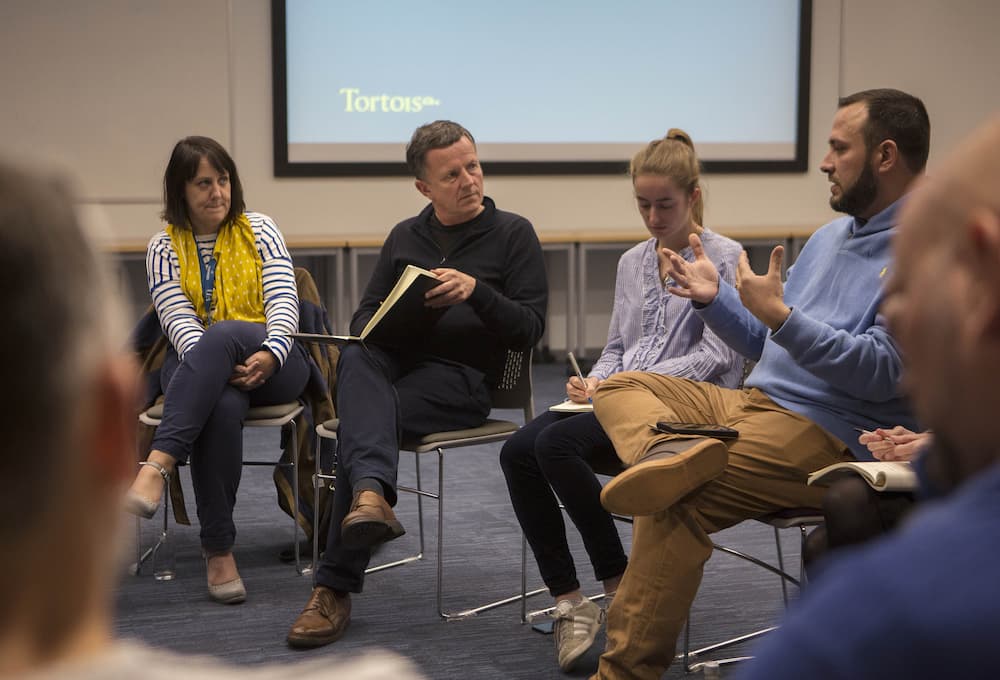
Bringing it back to Tortoise, what’s coming next?
"Well, Tortoise closed its Series A at the beginning of the year, so it's well funded for the next three years, which is a good place to be.
The growth plan in the current economic crisis has to be conservative, yet ambitious. Tortoise started by being a membership business and our community is now heading for 200,000. The paid-for members within that is 55,000 and growing.
Like all good startups, we had our pivot, during lockdown. We took stock of this younger membership base that I've talked about, and we realised that we were producing slow journalism that equal long reads - 25 to 30-minute reads. When was the last time you actually enjoyed reading anything for 30 minutes on your mobile phone? Not very often. So looking at all the data, we decided to pivot to audio.
We did that in 2020 during the lockdown and about this time last year, September or October 2021. At that time we had about three-quarters of a million listeners on a monthly basis. In 2022 it's one and a half million.
We've doubled our listener base in a year and we’re really focused on those listeners.
Our hypothesis is that we could probably get 1% of our listeners to become members. That’s where the pivot to audio has been amazing – it’s much more immersive. We get an 88% listen-through in our podcasts of 35 minutes to 45 minutes because it’s a highly intimate experience.
So growth plans are focused on growing that listener base, aiming for 10 million listeners a month with an ambition that 1% of those unique listeners to become members."
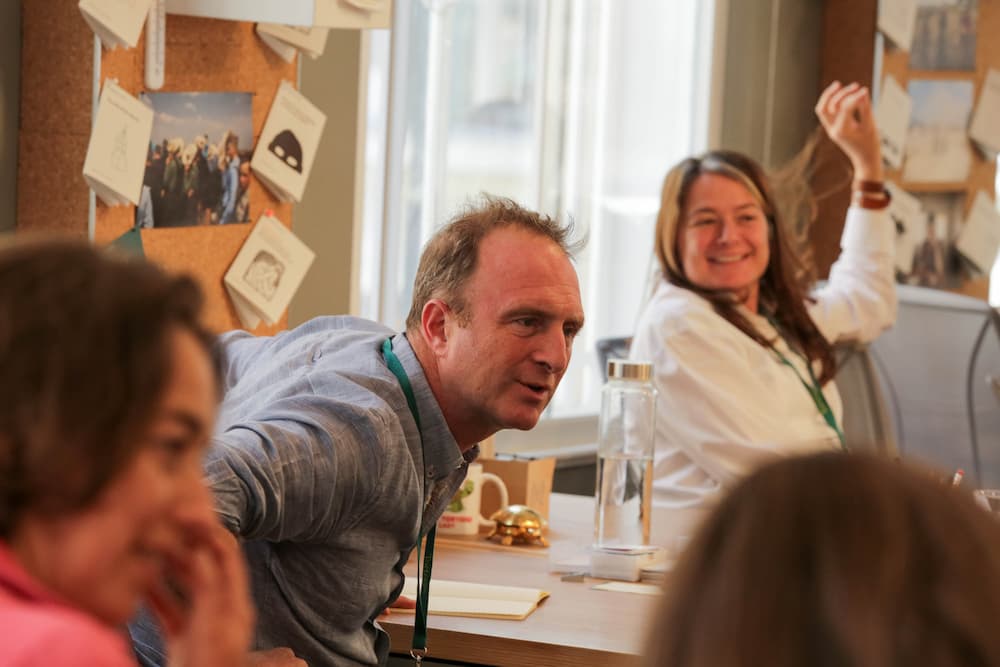
It’s a brilliant strategy. On to our rapid questions – first, specific business philosophies or management philosophies. We’ve talked about the slow principle - do you have other specific business or management philosophies that you use at Tortoise?
"We do, but slow is actually not one of them because even though we are slow for our members and slow as a newsroom in terms of our output, no journalist is ever slow!
They can't help it, it's in their DNA - it's like they've been injected with breaking news and they're bouncing around looking for more news. James and I set out with Matthew to build a different type of newsroom, not just in the fact that our output was slow but in being open.
Most newsrooms culturally have big walls between the commercial side and the journalism side because, rightly, editorial integrity matters - the fact that you can be really clear that the story always comes first. But I think that created some bad behaviors and “them and us” cultural norms – quite a combative culture. So, we really did set out to build a very different newsroom culture where James and I had partner tables. The rules are, “the story comes first, and nothing gets in the way of the story”. It is more important than that “them and us”, journalism versus commercial culture.
In terms of personal business philosophies, mine is that teams and workplaces should be like “work family” because you spend more time at work than you do with your family.
If you strive for work-life balance, I think you always fall over because you're always making impossible trade-offs, so work and life have to coexist and one has to be part of the other.
Work families are similar to families in that you don't necessarily like everyone in your family - and there are certainly individuals that you never want to get stuck with at a wedding - but you still have each other's back.
There's something really visceral about being a member of a family, even if you don't like the people in it. So we set ourselves up at work sometimes to have difficult relationships, because we recognise that you don't have to like someone and want to hang out with them to do great work together.
You have to have that respect and you have to have each other's back.
So we talk a lot about "work family", and then I talk about working hard, having fun and making history.
That’s our workplace culture and way of thinking."
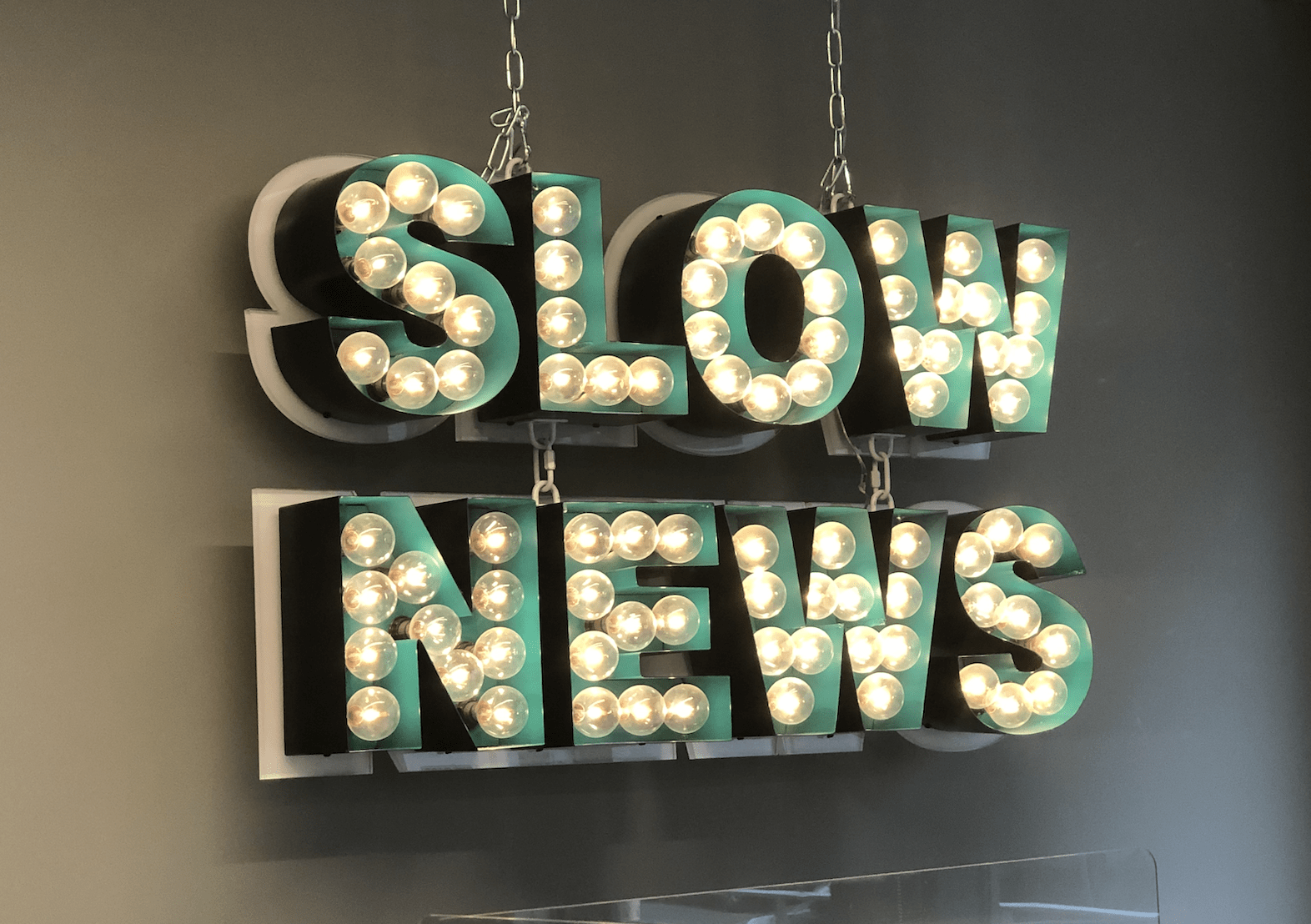
So, this series is Building Better Business - does Tortoise support programs or initiatives that might help to change the world?
"Yes - we had to create one, because we want to give everyone a seat at our table, but we have a paying membership model.
We realised very early on that we risked creating another version of all the great liberal elite newsrooms if we weren't careful. So we built the Community Network - a one-for-one model that was pioneered by Tom's Shoes.
We realised: we’re the wrong people to decide who is unrepresented so we work with charities, nonprofits and community networks and groups like Farms to Feed, Sutton Trust, the Social Mobility Foundation, Ambitious About Autism.
These great organisations are trying to change outcomes for different people in society and members of their communities get access to our Community Network, which makes our newsroom better."
Are you a fan of business books or podcasts? If so, what would you recommend?
"Not really, I just like interesting reads or interesting listens. So I'm currently reading Pyramid of Lies by Duncan Mavin, about Lex Greensill and Ponzi schemes. It’s very good.
And I've just finished Marcus du Sautoy’s Creativity Code about how AI is changing how we think, write, paint and so on. And I’m listening to Hoaxed, which is Alexi Mostrous’ “difficult second album” after Sweet Bobby, and it’s pretty good!"
What advice would you give to your younger self or any young entrepreneur starting a business today?
"Well, for entrepreneurs - it's never too late cause I started in my forties. I think that we come with a lot of life and business experience that can be super helpful to building or running any business.
There is a lot of data that older entrepreneurs are more successful - what you lack in energy as you get older, you make up for in experience, so embrace that experience.
For younger versions of myself I would say we now have a hundred-year life - so think in decades rather than short chunks - think in chapters. Don’t think about a career ladder, think about your career zigzagging - be clear that it's okay to take your twenties to figure out what you're good at.
It's okay to build your network in your thirties and keep doing it. And it's okay to start a business in your forties, because we've got a long old life!"
Final question – if you weren't doing what you're doing now what would you do or where would you be?
"Well, my alternative career was as a head mistress. I'm tough but fair and I like to change. I’d like to run a school that built on the principle of grammar schools, with assisted places, and change the outcome of people's lives. I think that really matters.
But right now, given there are some good schools out there already and politics right now is…not great…maybe I would go into politics, and try to change that."
All images courtesy of Tortoise Media
More Building Better Business Interviews
Learn from other founders, entrepreneurs and leaders who've featured in this series about better business practice.
Shamil Thakrar, co-founder of Dishoom
Sarah Waddington, founder of Socially Mobile
Shereen Daniels, author and MD HR rewired
Timpson CEO James Timpson
Saasha Celestial-One co-founder of OLIO
Sarah Jordan, founder of Y.O.U Underwear
Sarah Brown, founder of Pai Skincare
Ben Brooks-Dutton, Managing Partner at The Unmistakables
Emma Sexton, creative strategist and Founder, Inside Out Awards
Sam Branson, co-founder of HiddenLight and Big Change
Join Guild 🤝
See for yourself how the Guild experience is different to WhatsApp, Slack, LinkedIn or Facebook Groups.
Guild is a safe space to connect, communicate and collaborate with others.
Join us on a platform that is purpose-built for creating groups, communities and networks on mobile.